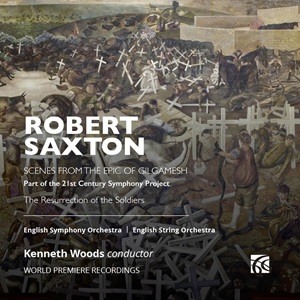
Robert Saxton (b. 1953)
Scenes from the Epic of Gilgamesh (2023)
The Resurrection of the Soldiers (2016)
English Symphony Orchestra, English String Orchestra/Kenneth Woods
rec. 2021 (Resurrection), 2023 (Scenes), Wyastone Concert Hall, Monmouth, UK
World premiere recordings
Nimbus Records NI 6447 [47]
The Epic of Gilgamesh is one of the oldest written literary texts. Sumerian king Gilgamesh, part divine and part human, may have been an historical figure circa 2800 BCE. In his early years, he believed himself to be immortal, but had to resign himself to mortality. The story has attracted several composers. Bohuslav Martinů’s oratorio and Per Nørgård’s opera come to mind.
Robert Saxton’s work, purely symphonic, is in five movements, or scenes, roughly linked to events in the epic. The first movement, a generic prologue, sets the scene and presents some of the thematic material of the work. The composer says that “the pitch centres of this scene spell out the musical letters of Gilgamesh which also underlay the entire work”. The opening of the first scene suggests “the anxious state of the city of Uruk, which is suffering under the despotic rule of the young King Gilgamesh”. In reaction, the gods create his counterpart, the wild man Enkidu. The music moves through a number of moods, some calmer, some more troubled.
The second scene, The Journey to the Forest of Cedar, depicts the difficult and arduous trek Enkidu and Gilgamesh make in search of glory. They have to go through the Forest to cut down one of the largest trees to make the great door for the temple of Enlil, the divine ruler of the cosmos. The music, mostly slow, treads heavily. I sometimes felt this was some sort of passacaglia; Saxton does not say anything about this.
The next movement, From Dawn to Dusk, is the work’s scherzo – the music moves along with alacrity, as it illustrates Gilgamesh’s race against the sun. He arrives just before sunset and finds himself in a garden of jewels. The next longest and weightiest movement, Lament of the Death of Enkidu, leads straight into the final scene, Apotheosis. In it, the music again uncovers varied musical landscapes until it reaches a subdued close: Gilgamesh has failed the final task to test his suitability for eternal life, so has to accept his mortality.
Saxton wrote Scenes from the Epic of Gilgamesh at the request of Kenneth Woods, who sought yet another piece for the English Symphony Orchestra’s 21st Century Symphony Project. Composers who wrote works for the project – already recorded – include Matthew Taylor (Symphonies Nos 4-5), David Matthews (Symphony No 9), Philip Sawyers (Symphony No 3) and Adrian Williams (Symphony No 1).
This substantial work is not laid out in the typical symphony mould. At the time of the first performance, the composer insisted that it should not be described as a symphony. What is clear, however, is it is a strongly argued symphonic piece. Whatever one’s idea about it, one can say with certainty that Scenes from the Epic of Gilgamesh is impressive music that deserves wider exposure.
The Resurrection of the Soldiers for strings was commissioned for the 2016 Presteigne Festival by George Vass, to whom it is dedicated, and by the English Symphony Orchestra. “The title derives from the final panel of Stanley Spencer’s Sandham Chapel visionary series of paintings, which were the result of Spencer’s experiences in World War One.” (The painting is reproduced on the booklet’s cover.) The work is in a single span of about a quarter of an hour, but falls into three interlinked parts. A slow, sustained introduction slowly ascends towards a tense climax; that leads into a “very active fugue” which reaches another anguished and sustained climax. The closing slow section suggests rebirth and hope. This compact, gripping piece definitely belongs in a long chain of masterly British works for strings.
Both works receive committed, beautifully played performances, and the recording is very fine. This is a most welcome addition to Robert Saxton’s discography. Nothing to complain about here, other than perhaps the short playing time, but that is not enough to deter anyone from investigating this rewarding release.
Hubert Culot
Buying this recording via a link below generates revenue for MWI and helps us keep free access to the site




















